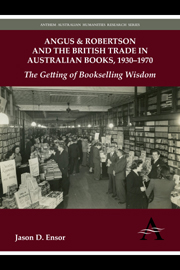 Angus & Robertson and the British Trade in Australian Books, 1930–1970
Angus & Robertson and the British Trade in Australian Books, 1930–1970 Published online by Cambridge University Press: 05 July 2013
Thus we must not join the lament of the speaker who deplored the fact that Australian publishers had failed to give their books an Australian appearance, as though end-papers must always have boomerangs.
The challenges of rebuilding operations between the Sydney and London offices of Angus & Robertson after the Second World War were exacerbated by the tight post-war import and export restrictions between Australian, sterling and dollar areas. Although precisely determining which restrictions altered which conditions of the Australian book trade during the 1940s and 1950s is challenging; the nature of the impact of import licensing emerges most clearly in correspondence between Australian publishers, industry organisations and the Department of Trade and Customs.
During the Second World War, the Division of Import Procurement emphasised how imperative it was that space on ships destined for Australia was ‘conserved only for those commodities considered to be of primary importance to the war effort’. Post-war currency shortages accentuated the need to preserve exchange reserves, and applications for licences to import fiction in paper covered editions – more specifically books in the genres of juveniles, light romance, detectives and westerns – were not made available ‘under any consideration’.
To save this book to your Kindle, first ensure [email protected] is added to your Approved Personal Document E-mail List under your Personal Document Settings on the Manage Your Content and Devices page of your Amazon account. Then enter the ‘name’ part of your Kindle email address below. Find out more about saving to your Kindle.
Note you can select to save to either the @free.kindle.com or @kindle.com variations. ‘@free.kindle.com’ emails are free but can only be saved to your device when it is connected to wi-fi. ‘@kindle.com’ emails can be delivered even when you are not connected to wi-fi, but note that service fees apply.
Find out more about the Kindle Personal Document Service.
To save content items to your account, please confirm that you agree to abide by our usage policies. If this is the first time you use this feature, you will be asked to authorise Cambridge Core to connect with your account. Find out more about saving content to Dropbox.
To save content items to your account, please confirm that you agree to abide by our usage policies. If this is the first time you use this feature, you will be asked to authorise Cambridge Core to connect with your account. Find out more about saving content to Google Drive.